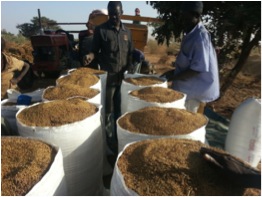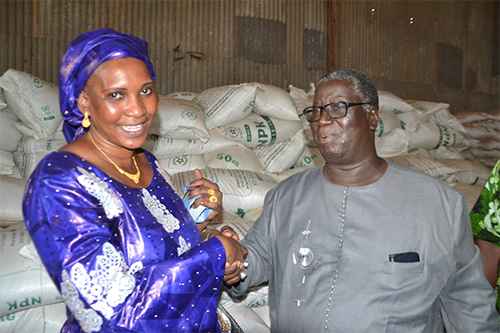
NCBA CLUSA also assists in advertising locally produced millet on the Senegalese marketplace as an alternative to imported rice and other grains.
This project will achieve two objectives:
- Increase agricultural productivity of the millet value chain by developing processing systems; building capacity of producers to improve production and quality; training producers and processors in improved production techniques, post-harvest handling, marketing, and seed production; and providing grants and loans for equipment and inputs; and
- Expand trade of millet by developing public-private relationships, facilitating trade relationships, researching export opportunities, building agricultural extension capacity, and promoting food safety issues and requirements.
Female Leader Steps Up To Support Senegalese Millet Farmers

When Seynabou Fall, a 47 year-old mother, and president of the Wack Ngouna Millet Network, negotiated their biggest ever supply contract, she realized the organization would have to produce and store more millet than they ever had before. When her husband retired, it fell to Fall to support the household. Looking to increase incomes for herself and her network members, she started seeking new markets and millet buyers.
With support from the USDA-funded Millet Business Services Project, which NCBA CLUSA implements in Senegal, the producer network on the Senegal-Gambia border negotiated a 1,000 ton contract with Mamelles Jaboot, a large Senegalese buyer and distributer, who makes yogurts and other products with local grains like millet.
Members of the network were already using conservation agriculture, which many had learned through trainings as early as 2009 during the first phase of the USDA Millet projects, and yields had increased on average 60 percent. But, to meet the needs of the contract, Fall knew the producer network had to both grow enough millet and store it sanitarily to preserve the quality.
She reached out to the USDA Millet Business Services Project for trainings on best practices and organizational support. To properly store the millet and provide access to equipment for harvesting and sowing, the project built two millet hubs to service the region-wide network. With a strong organizational understanding, Fall understood that to meet the contract needs, members of the network would need access to agricultural equipment like seeders, hoes and tractors.
With business planning support from the USDA Millet Services project, Fall and her producer network were able to secure a 65 million FCFA (over $100,000 USD) 3-year loan from the National Agricultural Credit Fund of Senegal (CNCAS). The money was invested in 150 seeders and 150 hoes for the network. The USDA Millet project was also able to connect the group with government support, and Fall secured a subsidized tractor after local leadership visited the group during an economic development tour in early 2019.
“I coordinate all the activities of the network. I accept my responsibility on behalf of the network for contracting with partners. I make sure that orders are correctly executed by the management and technical team of the network,” said Fall. The 160 million FCFA ($275,000 USD) Mamelles Jaboot contract would be almost the entire network’s yield, a huge jump from their initial harvests.
From production, to accessing finance, to storage and marketing, the USDA Millet project has come alongside Fall and leaders like her to support the Wack Ngouna Millet Network grow stronger.
“The partnership has been very beneficial to the network. First, the project helped to strengthen productive capacities of network members with demonstration plots, composting training and more,” said Fall. “Then the multi-service hubs came just at the right time to store and preserve and market the millet and allowed us to honor our commitment to agro- industrial partners like Mamelles Jaboot.”
She is now sending her eldest child to university and is considered a leader in the community beyond the network. Some of the women and youth consider her a type of godmother and invite her to social and cultural activities.
Today, Seynabou Fall is a member of the general office of the millet producers’ networks in the three regions of Kaolack, Kaffrine and Fatick. The annual production for her nearly 2,000-member group has increased from 10 tons in 2011 when they organized to over 1,000 tons this year. The network has become the main economic driver in the Keur Maba, Keur Mandongo, and Wack Ngouna communes (around 200 miles south of Dakar) and will continue to increase its ability to negotiate contracts, meet demand and access finance to meet the needs of its contracts. Building that sustainable capacity will continue to increase economic opportunities at the local level, support food security and resilience and enable women’s leadership to thrive in Kaolack, Senegal.

